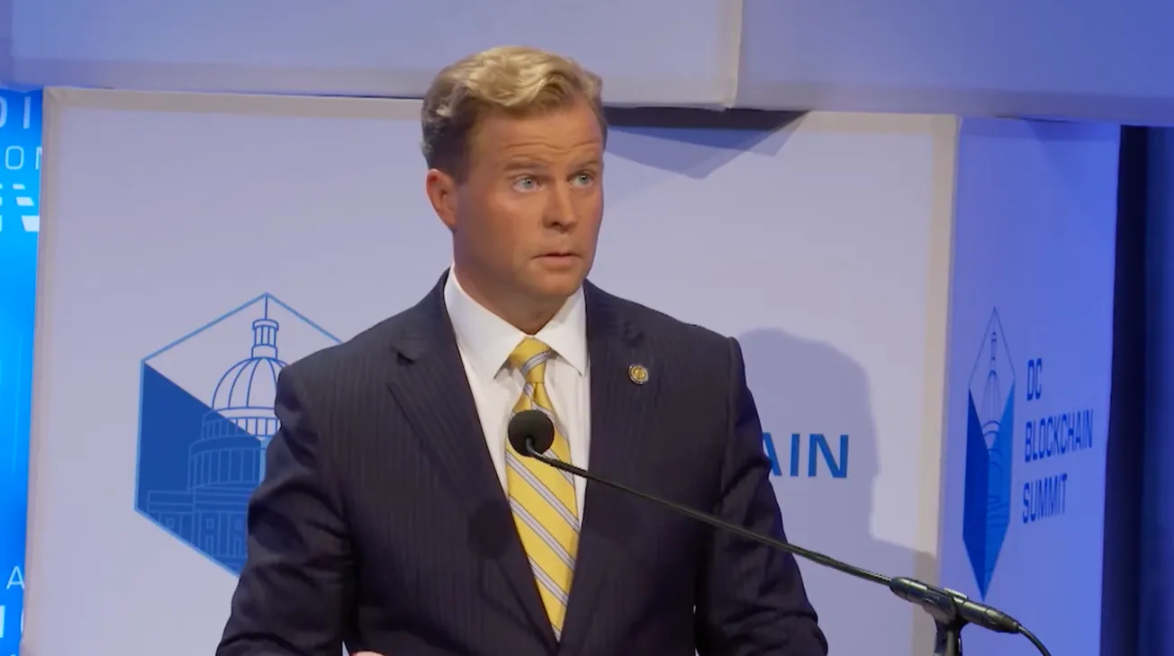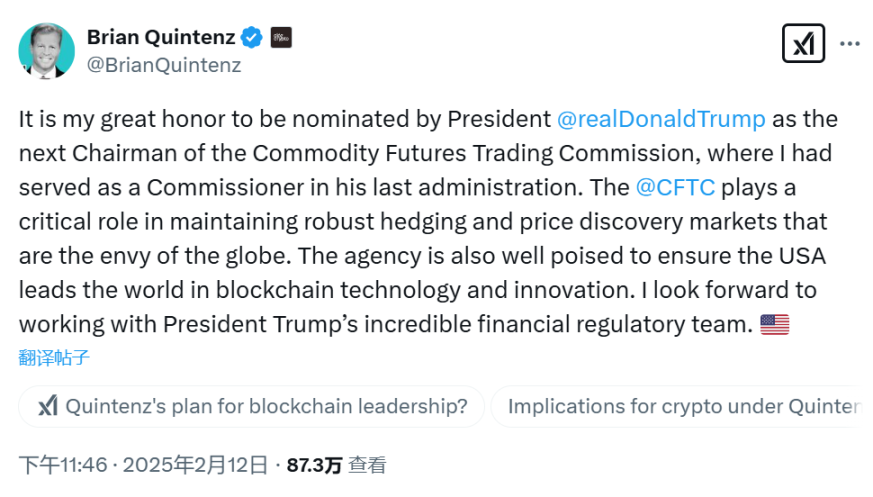Original Author: 1912212.eth, Foresight News
Since officially taking office in the White House, Trump has frequently introduced favorable policies. Recently, Trump nominated Jonathan Gould, the former Chief Legal Officer of Bitfury, to serve as the Director of the Office of the Comptroller of the Currency (OCC), responsible for regulating the national banking system. This nomination was submitted to the Senate on February 11, with a term of five years.
In addition, he also nominated Brian Quintenz, the policy head of a16z, to be the Chairman of the Commodity Futures Trading Commission (CFTC).
The influence of the OCC cannot be underestimated, as it is one of the most powerful banking regulatory agencies in the United States. The banks regulated by the OCC control a significant portion of the U.S. banking industry's assets, including major banks such as Citibank, JPMorgan Chase, and Bank of America. Given the central position of the U.S. banking system in the global financial market, OCC policies will impact international interbank transactions, the U.S. dollar clearing system, and global financial stability. In recent years, the OCC has allowed national banks to offer cryptocurrency custody services and explored the integration of stablecoins with the banking system, which has far-reaching implications for the compliant development of the cryptocurrency industry.
Kristin Smith, CEO of the Blockchain Association, a cryptocurrency advocacy organization, stated that Gould is an excellent choice for the Director of the OCC, as his experience in the cryptocurrency industry enables him to effectively lead the agency. Avichal Garg, co-founder of Electric Capital, also expressed that Gould's nomination is a very positive development for fintech and cryptocurrency founders seeking better financial services.
So who exactly is Gould, to receive such high praise?
Impressive Background in Crypto, Law, and Financial Management

Gould graduated from Princeton University and later obtained a Juris Doctor degree. During Trump's first term (from late 2018 to mid-2021), he served as the Senior Deputy Comptroller and Chief Counsel of the OCC. Records show that during his tenure at the OCC, Jonathan led the legal and licensing team through a significant period of transformation, pushing the agency to update its regulatory and licensing framework to adapt to the evolution of the banking industry. These reforms included major revisions to banking regulations, involving the implementation of the Economic Growth Act, among others. Under his leadership, the OCC approved licenses for fintech and cryptocurrency banks for the first time, confirming the legality of crypto-related businesses.
In 2022, Gould became the Chief Legal Officer of Bitfury, a company that produces Bitcoin mining equipment, which was valued at $1 billion several years ago. Gould is currently a partner at the law firm Jones Day.
He also served as a director at BlackRock from 2014 to 2018. BlackRock is one of the largest asset management companies in the world, currently managing over $10 trillion in assets, holding a significant position in the global financial market.
Gould is well-versed in law and has experience in both a Bitcoin mining company and the asset management giant BlackRock, with a solid background in crypto, finance, and law. If formally appointed, crypto regulation may see a relaxation. Recently, Gould opposed Chokepoint 2.0 (which aims to sever the connection between crypto and banks) and expressed a desire to provide fair access to banking services for crypto companies.
CFTC Nomination for Chairman from Venture Capital a16z's Policy Head
Recently, Trump also nominated Brian Quintenz, the policy head of a16z, to be the Chairman of the Commodity Futures Trading Commission (CFTC). The former CFTC Chairman has stepped down, and Caroline Pham, nominated by Trump, is currently serving as the acting chair. Earlier this year, Trump's team interviewed several candidates, including CFTC Commissioner Summer Mersinger and former Kraken Chief Legal Officer Marco Santori, but ultimately chose Brian Quintenz.
The primary function of the CFTC is to regulate the U.S. derivatives market, particularly futures, options, and other derivative trading, which includes futures and options contracts related to commodities, stocks, bonds, and foreign exchange, making it one of the most important regulatory bodies in the cryptocurrency sector.

Brian Quintenz graduated from Duke University. From 2001 to 2007, Quintenz worked in the office of U.S. Congresswoman Deborah Pryce as a senior policy advisor. In 2013, he founded Saeculum Capital Management, focusing on risk management and technical analysis investment strategies.
In August 2017, Brian was nominated by Trump as a CFTC Commissioner and was confirmed by the U.S. Senate the same month. During his tenure, he led the CFTC's Technology Advisory Committee and hosted public policy discussions and briefings on cryptocurrency. He also supported the development of tailored risk-adjusted regulatory policies for emerging areas such as decentralized finance (DeFi).
In September 2021, Brian joined Andreessen Horowitz as the policy head of the crypto department.
During his time at a16z, Brian recently wrote that "when it comes to regulation, we can finally relax." For many, concerns about excessive regulation have led project teams to delay using tokens to allocate project control and build communities. Now, there should be more confidence in using tokens as legitimate and compliant tools for projects.
It is worth mentioning that after being nominated as the next CFTC Chairman, Brian tweeted in response that the CFTC plays a key role in market price discovery. The agency is also prepared to ensure that the U.S. remains a world leader in blockchain technology and innovation. "I look forward to working with President Trump’s financial regulatory team."

In the past, both the SEC and CFTC have been involved in enforcement actions regarding the cryptocurrency industry, and they have also been at odds over whether certain tokens should be classified as securities. Recently, Forbes business reporter Eleanor Terrett revealed that as digital asset regulation becomes a priority, the SEC and CFTC are discussing strengthening cooperation on cryptocurrency regulation and considering restarting the SEC-CFTC Joint Advisory Committee, which has been inactive since 2014, to provide a discussion platform for both agencies on emerging regulatory issues.
Summary
Currently, it appears that Trump is practicing his consistently friendly attitude towards the cryptocurrency industry since taking office in the White House, with several government officials and regulatory heads being pro-crypto individuals. The past shadow of strict regulation and suppression of the cryptocurrency industry may dissipate, and a number of U.S. blockchain entrepreneurs may welcome an era of the most lenient policies.
免责声明:本文章仅代表作者个人观点,不代表本平台的立场和观点。本文章仅供信息分享,不构成对任何人的任何投资建议。用户与作者之间的任何争议,与本平台无关。如网页中刊载的文章或图片涉及侵权,请提供相关的权利证明和身份证明发送邮件到support@aicoin.com,本平台相关工作人员将会进行核查。



